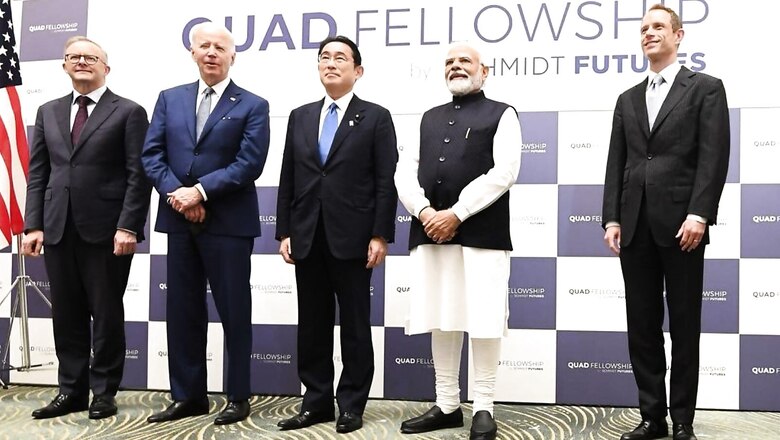
views
A new 21st century foreign policy is being written in the background of the battle lines being drawn in the Indo-Pacific. The ‘Great Game’ now stretches from Afghanistan to this vast area of immense geopolitical significance. The Indo-Pacific is marked by a precarious geometry of fault-lines and historic strategic mistrust. It has become the centre of China’s efforts to establish its pre-eminence as the dominant, indeed, sole superpower.
What is the geographic scope of the Indo-Pacific? It is generally agreed that it extends from the east coast of Africa to the west coast of the Americas. Drawing precise geographic borderlines is not important since the Indo-Pacific is primarily a geostrategic concept. It is the core and nerve centre of international geopolitics and a new global power game. It is encircled by major population centres. Eight of the top twenty economies are situated here, giving it immense geo-economic importance.
New threats and challenges to the existing world order have emerged in this region, led by a resurgent, aggressive and militaristic China. A determined and crafty Xi Jinping is plotting the central positioning of the ‘Middle Kingdom’ at the expense of the existing world order, led by the US. Central to that ambition is to establish dominance in the South China Sea and the Taiwan Strait and prepare for the future annexation of Taiwan. Cold War 2.0 is upon us.
China’s perspective is clear. China sees neighbours as either vassal states or enemies. India is a natural check to its ambitions. China wishes to alter the power equation with India permanently in its favour. This lofty ambition China is trying to achieve by constant tension along the Line of Actual Control (LAC), especially in eastern Ladakh, by trying to extend the China-Pakistan Economic Corridor (CPEC) to Afghanistan and by actively countering
India’s influence in Nepal, Sri Lanka and Maldives.
The threat is not just land-based but also from the sea. China considers itself to be a major maritime and continental power. Its aggressive posturing in the Indo-Pacific, the South China Sea and now in the Taiwan Strait is an ominous indicator of the threat it poses to Taiwan and India and to the Western alliance, ASEAN and Quad.
The Quad, consisting of Australia, Japan, India and the US, with its commitment to a rule-based order, represented the first realistic response to China’s aggression by sea and land, especially in the Indo-Pacific.
Indian policymakers are redefining India’s strategic autonomy as an objective that is attainable through strengthened partnerships, whether bilateral with the US or through Quad. To India the Quad represents a strategic alliance, corresponding to the challenges of the times.
Quad was followed by AUKUS. Both represent a push back by the West and emerging powers to China’s efforts to militarise this strategic region. AUKUS was intended to provide Australia with the necessary military support to contain China in the Indo-Pacific. It was a confrontational Indo-Pacific strategy, with containment at its core.
Prior to Ukraine, the West’s focus had shifted to a better realisation of the threat China posed to the Westphalia order established after World War II. Even the EU, after tortuous negotiations, announced an ‘EU Indo-Pacific Strategy’ on 16 September 2021.
For the EU, from shying away from the term ‘Indo-Pacific’ two years ago to now, the transition was remarkable and long overdue. Brussels was aware that the absence of a robust EU Indo-Pacific policy impacted the EU’s position. The economic priorities could not be overlooked either. The Indo-Pacific region represents the second largest market for the EU outside Europe. The majority of European trade crosses the sea lanes in the South China Sea to reach four of the EU’s top trading partners.
For the first time the EU publicly acknowledged: “The futures of the EU and the Indo-Pacific are inextricably linked given the interdependence of the economies and the common global challenges.”
Of greater significance was the assertion: “The Indian Ocean is the principal passage for Europe to and from Indo-Pacific markets. Stability and freedom of navigation in this area are therefore vital.”
The Ukraine conflict cast a long shadow on these positive developments. The first major war fought on European soil since World War II it initially diverted the attention of the West from China to Russia. It was a sharp reminder that conflicts need not always be fought out in distant lands.
The response was an overreaction by the West. Russia must be punished, its military machine destroyed and with punitive unilateral sanctions, Russia’s economic development be pushed back 50 years. The West did not take into account that Russia was a great power, connected to Europe through history and geography and a P5 member with a formidable nuclear arsenal. Russia could not be punished like Iraq or Libya. In an interconnected and globalized world, the expectations of the West were thus belied almost from the beginning.
Russia did not lose the war but nor did Ukraine. So what happened? A short war, where Ukraine fought off the fall of Kiev, was followed by a much longer war. It drained Ukraine’s weapons, lives and wealth, displaced the civilian population and destroyed the infrastructure. Not losing now looked uncomfortably a lot more like Ukraine ultimately losing territory and the war, rather than winning. Not losing did not translate into victory for Ukraine.
President Putin was also able to divide the EU on the sanctions issue by drastically curtailing gas flows through Nord Stream 1 (NS1), a pipeline from Russia to Germany. This prevents the EU from building up reserves for the long winter ahead. These tactics appear to be very effective.
Annalena Bearbock, Germany’s Foreign Minister ruefully noted: “If Germany’s gas were to be cut off we won’t be able to provide any support for Ukraine at all, because we will be busy with popular uprisings.”
Timothy Garton Ash in ‘The Guardian’ of 5th August 22 wrote: “Putin is counting on Russia’s two traditional wartime allies: Field Marshal Time and General Winter. The Russian leader is weaponising energy, reducing gas flows through the Nord Stream 1 pipeline so Germany cannot fully replenish its gas storage before the weather turns cold. Then he will have the option of turning off the gas entirely, plunging Germany and other dependent European countries into a desperate winter”.
The Ukraine conflict also changed the current power equations. Russia became a junior partner of China. The strategic balance shifted in China’s favour. This was underscored in the recent tensions in the Taiwan Strait following US Speaker Nancy Pelosi’s visit.
China conducting military drills in the Taiwan Strait and simulating a military invasion of Taiwan was a wake up signal to the West that NATO alone can no longer guarantee the current world order. China’s missiles were landing very close to Taiwan and within Japan’s EEZ.
The international situation had become increasingly volatile. China’s neighbours followed these developments in stony silence and increasing alarm and dismay. As China faces increasing isolation, the greater becomes its belligerence. Is India next on China’s ‘check list’ after Taiwan? Only time can tell but China’s behaviour gives no room for optimism.
Is war over Taiwan inevitable? The historical record suggests war is more likely than not. More troubling, the military balance in the Taiwan Strait has been transformed in the quarter century since the last Taiwan crisis. Former Deputy Secretary of Defence Robert Work recently publicly acknowledged that in the Pentagon’s most realistic simulations and sensitive war games, in conflicts limited to Taiwan, the score is eighteen to zero in favour of China, in a limited and non-nuclear conflict.
The present international scenario is thus fraught. It can be compared to the situation in the 1930’s prior to the rise of fascism and Hitler. Revisionist States like China are seeking to change territorial arrangements through military force. History has shown that there are four ways to respond to such militant territorial revisionism, including appeasement, neutrality, capitulation and confrontation.
The events leading up to World War II demonstrate that appeasement can delay a war but cannot prevent it. History reminds us that the cowardly and time serving appeasement of Hitler with the Munich Pact made World War II inevitable. Britain initially under Chamberlain chose appeasement, France capitulated and the US was neutral until Japan attacked Pearl Harbour. It was finally Churchill who chose confrontation.
A visit down memory lane should suffice to remind the West that history can repeat itself. China’s ambition to become the only super power, unless checked, could lead to another Great War, with the possible use of nuclear weapons.
There are many instances of an autocratic leader like Xi Jinping embracing revisionism as a doctrine and choosing war instead of peace. Dr Graham T Allison from the Harvard Kennedy School recently wrote: “The past 500 years have seen sixteen cases of such Thucydidean rivalries. Twelve resulted in war. But beneath these were underlying structural drivers that Thucydides highlighted in explaining how the two leading city-states of classical Greece destroyed each other in the Peloponnesian War. Thucydides wrote: “It was the rise of Athens and the fear that this instilled in Sparta that made war inevitable.”
Dr Allison morosely concludes: “If the best the current US and Chinese governments can manage is statecraft as usual, then we should expect history as usual. Tragically, history as usual would mean a catastrophic war that could destroy both”.
Is confrontation the answer? The world is coming out of an unprecedented pandemic and economic recovery has been severely hit by the Ukraine conflict. Appeasement of China may buy time but cannot prevent war. Alliances and security arrangements are the answer. The Pelosi visit was a turning point. China’s over reaction was a rude reminder that a flashpoint in current tensions could escalate into a major conflict.
Quad is a viable option for the future security of this vast region. It is a forceful idea whose time has come. It rejects appeasement and recognizes the challenges of China’s unimpeded rise. Quad marks the emergence of a new World order based on the security of the Indo-Pacific. NATO is an institution of Cold War 1.0. Quad represents the response to Cold War 2.0.
If the new ‘Great Game’ is to be won, such arrangements like Quad and AUKUS must focus on containment of China, re-assertion of the global balance of power and simultaneously, the search for resilient and alternative supply chains.
A major setback to global recovery is the Ukraine conflict. It must be brought to an early conclusion. The West must learn to deal with Putin and Russia, rather than seek to bleed and destroy it. An alliance of China and Russia, with the latter as a junior partner is an even greater threat to international peace and security.
In a recent article Henry Kissinger at the age of 99 had invaluable advice to offer to the West: “The question will now be how to end that war. At its end a place has to be found for Ukraine and a place has to be found for Russia — if we don’t want Russia to become an outpost of China in Europe”.
India’s time has also come. What are India’s options? India had not referred to the ‘One China policy’ since 2006. On 12 August 2022, India broke its studied silence on the Taiwan issue and expressed concerns over the Cross-Strait tensions. India called for restraint and for avoiding any attempt to unilaterally change the status quo. The Indian spokesperson, A Bagchi, when questioned about India’s One China policy significantly said: “India’s relevant policies are well-known and consistent. They do not require reiteration.”
India, despite an asymmetrical balance in favour of China with regard to the size of China’s nuclear arsenal, has effectively stood up to China in the LAC. No other option is available or possible. Appeasement is not an option for a hostile neighbour busy ‘salami slicing’ India’s territory.
Confrontation appears inevitable to stop a revisionist power on the march. Quad is India’s partner. Alliances are necessary to ensure that India is not alone and can stare down China. Another great war looms uneasily on the horizon.
The author is a former Ambassador of India to the Netherlands. Views expressed are personal.
Read the Latest News and Breaking News here

















Comments
0 comment